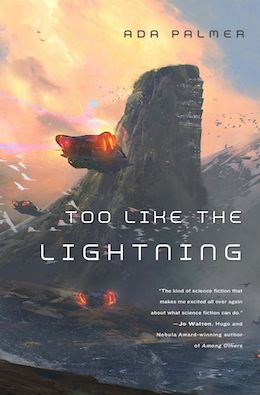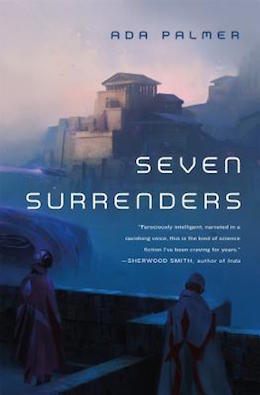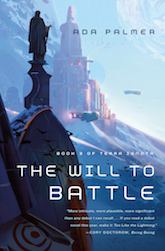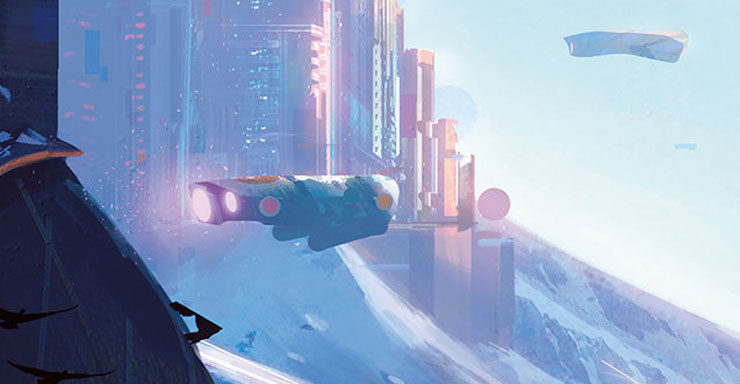At Readercon last summer, when I saw that Ada Palmer was hosting a kaffeeklatsch, I jumped at the chance to join in. Having just read her debut, Too Like The Lightning, a few months earlier, I was thrilled at the prospect of having an hour to sit with her and other fans and pick her brain about the vast, complicated world of Terra Ignota and the future of 2454 that she had painstakingly created. During the discussion, someone asked something about how she had written a utopia, to which Ada chuckled for a moment, possibly thinking over all the complications—all the wrenches she’d thrown into the gears, basically—when it came to creating her world. Then, she said, “Well, it’s not quite a utopia, as it is utopian,” which she went on to explain means that while the world itself is utopian in nature, the future itself is far from a perfect utopia. She’s actually gone into a bit more detail about this distinction on her blog, stating:
…[W]hen I talk about a “utopia”—a work intending to depict an ideal future—that is not quite the same as a work which is “utopian” i.e. addressing the idea of utopia, and using utopian positive elements in its future building, while still focusing on people, characters and events, and exploring or critiquing the positive future it depicts, rather than recommending it. 2454 as I imagine it is not a utopia. There are many flaws and uncomfortable elements…. It is using utopia and commenting on utopia without being a utopia.
Which, of course, got me thinking.
[Spoilers for Too Like the Lightning and Seven Surrenders below.]
Buy the Book


Too Like the Lightning: Book One of Terra Ignota
A utopia is, in itself, a static thing. A society has achieved perfect balance, all conflicts are at an end, and as far as every day life is concerned, everyone is pretty happy. This usually involves free healthcare, most illnesses at an end, lifespans extended, little to no scarcity, and an overall increase in the quality of life for even the least important or powerful of its citizens. And despite the surface level engagement of a world where everything is stable, there seems to be little to nowhere one can go when it comes to a plot. It stands to reason that utopias might be considered boring, because nothing ever changes: the status quo is peace, and on a narrative level, that can be stifling. However, with Palmer’s Terra Ignota, which is utopian in flavor, sure, but not at all short on conflict, I was curious as to why that is, and how her books negotiate this line between utopian elements and actual utopia.
Palmer joins a wide-ranging group of writers interested in the complications that come with a seemingly perfect world. Sure, Starfleet gets involved in conflict on a galactic scale, but for the average citizen of Earth under the Federation, people are doing pretty well.
Likewise, Malka Older’s Centenal Cycle is heavily invested in a near-future that—while not quite utopian in flavor—is in far better shape than our current 21st-century society in different ways. With the power of micro-democracies dictating the way the future works, nations and national governments have been abandoned, and citizens are in a far better position to invest in and live in territories known as centenals, “microdemocracies” that allow them to live under governments they agree with. With their preference chosen, they get to live easier, not having to worry about battling with opposing parties over healthcare, federal oversight, elections, etc., since their government is something they got to choose according to their values and priorities—though there are still plenty of things that can go wrong even in this seemingly ideal system.
Buy the Book


By all measures, the Terra Ignota series is actually quite invested in what delineates a utopian world from a utopia, as Palmer defines it. To the average citizen of this world, it is a utopia: human lives have been extended well into their mid-hundreds; there is little to no scarcity; transportation is not instantaneous, but getting from Buenos Aires to Tokyo only takes about forty minutes; everyone has a job, and you only have to work about twenty hours a week. Compromises are necessary, of course, as the social structure of the world demands certain concessions from individuals, seeking the good of their bash or the Hive overall, and the dissolution of organized religions and gender norms of any kind can, it may be argued, lend more fuel, not less, to the fire of cultural conflict. However, the average citizen of Terra Ignota doesn’t worry about these things; in fact, as far as they are concerned in their day-to-day lives, they are living in a utopia and are content to do so—potential advances that may come from conflict be damned.
Palmer neatly sidesteps this issue in two ways: one of which is that the point of view characters she is utilizing in order to introduce this world to her readers are the elite, main players of nations, of creeds, of organizations, of Hives, and society at large, who are either obsessed with keeping the status quo as is, or in changing it for their own benefit. Second—and this strategy is more evident in the second book in the series, Seven Surrenders—Palmer has these power players actually questioning the nature of a utopia, and whether or not it is a benefit to the world at large.
Ironically, the one Hive in this society most obsessed with this question are the Utopians. Forward thinking, equipped with technology beyond compare, and utterly dedicated to bringing about the interstellar future that humanity has been dreaming of for years, the Utopians, and one individual in particular, are the characters most consumed with the idea that by crafting the utopia Earth has become in the year 2454, humanity no longer has any interest in pushing itself further. As stated above, a functional utopia is ultimately stagnant: it doesn’t give its citizens anything more to strive for. And for a group of people dedicated to living on Mars in two hundred years, the Utopians are terrified at what Earth’s stagnant society could mean for them—especially since there are other powers at work looking to shatter the peace and promote a type of conflict that hasn’t been seen in hundreds of years: war.
Buy the Book


The Will to Battle: Book 3 of Terra Ignota
Palmer’s choice to have Mycroft Canner act as the voice of the series—a character whose earnest heart, brilliant mind, and tortured soul have been shaped so directly by the world itself–is especially interesting. For Mycroft is an infamous criminal, a mass murderer whose criminal actions can be seen as a direct result of what the world has become. Fearing that this utopia had in effect neutered humanity’s ability to become monstrous, fearing that the benign, banal lives of everyday citizens would muddy the waters of human passion, he and his partner set out to prove humanity’s newfound sense of peace and acceptance wrong, to show that at the end of the day, humanity’s impulses remain primal. Seeing him live in this world, after his capture and penitent torture, makes for a very fascinating, complex, and conflicted point of view.
This kind of fascinating, seemingly unsolvable contradiction is a defining characteristic of Palmer’s Terra Ignota series, and exemplifies the kind of abstract, profound, complex thinking that captures the hearts of science fiction readers. Nothing is clear-cut, and everything is at stake. By focusing on those in power, and those who fear for the future, she is able to outline every argument for what a utopia means, both good and bad, to its citizens and to those who safeguard its structure. The central question driving Too Like The Lightning could be said to be: if this is what the future has become, what other conflicts could there be? The central questions underlying its sequel, Seven Surrenders, would then be: if this is the utopia we’ve earned, then what will we do to protect it? And are we worthy of it? Palmer doesn’t shy away from these heavy questions, and with brilliant prose, and ocean-deep character study, she toils away at them with heart and intelligence. The answers are still in the works, as there are still two more books to come in the series, but I look forward to reading them, and struggling with the answers, just as the citizens of Terra Ignota do.
Too Like the Lightning and Seven Surrenders are available now from Tor Books. Book 3 in the Terra Ignota quadrilogy, The Will to Battle, publishes in December 2017.
This article was originally published in April 2017.
Martin Cahill is a contributor to Tor.com, as well as Book Riot and Strange Horizons. He has fiction forthcoming at Beneath Ceaseless Skies and Fireside Fiction. You can follow his musings on Twitter @McflyCahill90.










